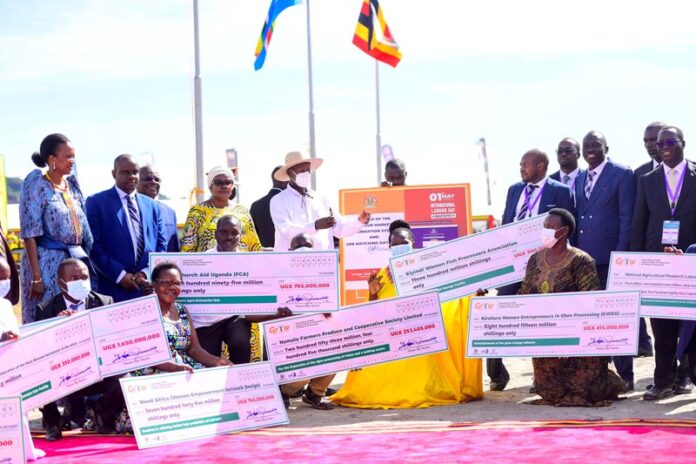President Yoweri Museveni said the government is preparing to engage more deeply on key issues, including the establishment of a minimum wage, the phasing out of casual labour, and stricter regulation of employment agencies, among other possible significant reforms in Uganda’s labour sector.
The President made the remarks during this year’s International Labour Day (ILD) celebrations at Nakaale Grounds, Nakapiripirit District. The event ran under the theme: “Consolidating on the Gains of the Parish Development Model (PDM) for Increased Productivity and Inclusive Job Creation”.
The President informed workers that the Cabinet would revisit these matters in June this year to explore realistic and sector-based solutions.
“I had a discussion with workers yesterday at State House, Entebbe. We talked about the minimum wage, the tripartite arrangement, and the issue of casual labour,” he said.
“We shall discuss more in June in the Cabinet. We are also going to look into employment agencies that exploit workers by standing between them and employers.”
The President highlighted that the process would be consultative and rational. “We must handle things the way they are. The approach we discussed, dealing with issues sector by sector is more realistic,” he added.
Museveni also criticized the current use of foreign labour in sectors where Ugandans are qualified. “Why should foreign companies bring their own workers when Ugandans can do the jobs?” he asked, pledging that the government would scrutinize institutions that have historically prioritized foreign over local labour.
On job creation, the President assured Ugandans that the National Resistance Movement (NRM) government will continue fighting unemployment by creating more jobs.
“As we stand today, according to figures from UBOS, there are 1.4 million workers in the factories, in agriculture, there are 3.6 million, in services there are 5 million and in ICT, there are 46,000. Now the jobs in the public service are 480,000. Therefore, the jobs in the private sector are very many compared to the public sector. And we are just beginning,” he said.
The President underscored that true job creation stems from building wealth rather than focusing narrowly on employment.
He cited examples of small-scale entrepreneurs empowered through the Parish Development Model (PDM), saying the program was already creating sustainable livelihoods.
“In Fort Portal, a man called Nyakana started making animal feeds on 1.2 acres. He now employs 15 people. Another, here in Nakapiripirit, used PDM money to grow green grams, sold them, and bought pigs. Now he has 35 pigs and is self-employed,” President Museveni narrated.
He emphasized that jobs cannot exist without wealth, whether created by the government or the private sector. “Wealth comes first. Jobs come from wealth,” he said.
“That is why we are investing in low-cost electricity, better transport like railways, affordable credit through UDB and PDM, and cheaper internet, all to support wealth creators,” he said.
He called on Ugandans, especially workers, to embrace patriotism and Pan-Africanism. “Factories and jobs mean nothing without a market. That’s why you must love Uganda, love Africa. Our internal market isn’t enough. We need East Africa and beyond,” President Museveni said.
The Minister of Gender, Labour and Social Development, Betty Amongi noted that the labour force remains the backbone of Uganda’s economy.
“We are assessing the challenges we continue to face, opportunities that lie ahead and recommitting ourselves to ensuring that we enforce employment practices that enhance productive employment.”
Amongi also reiterated that Uganda’s labour force is predominantly composed of a young population constituting 73 percent who are under the age of 30,according to the Uganda Bureau of Statistics 2024 Census.
The Minister of State for Labour, Employment and Industrial relations, Anyakun Esther requested the President for his continued support in the implementation of the 3rd Decent Work Country Program. “The program is key in improving working conditions and also influencing labour productivity,” she said.
John Oketcho, the Chairman General of the Central Organization of Free Trade Unions (COFTU), on behalf of the workers, thanked President Museveni for his tirelessness and unending support rendered to workers and all Ugandans at large.
The Chairperson of Uganda Federation of Employers, Fred Bamwesigye commended the NRM government under the visionary leadership of President Museveni for developing and stabilizing the economy of Uganda.
At the same event, 61 persons were awarded with medals for their exceptional service towards the development of Uganda.
The President also launched the Third Decent Work Country Program 2025/26-2029/30, a strategic framework aimed at promoting employment, protecting workers’ rights, and fostering social dialogue in Uganda.
He also commissioned the Labour Market Information System and a new Digital Job Matching system.



